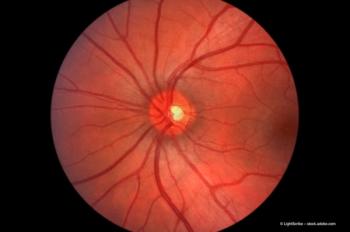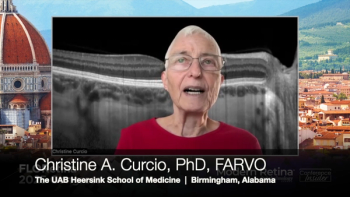
Outlook for integrin peptide therapy
ALG-1001 is the first of a new class of drugs, integrin peptide therapy, now going through clinical trials for patients with age-related macular degeneration, diabetic macular oedema and vitreomacular traction.
For patients with wet AMD, current anti-VEGF treatments very quickly reduce leakage and improve vision, with dramatic improvements compared with baseline.
An ongoing challenge, however, is that many patients don't respond to anti-VEGF therapy, and for those patients whose condition does respond to treatment maintaining the gains over time requires frequent injections. The AURA study, an observational study in several European and South American countries, has recently made this all too clear.1
A multipronged approach
Currently approved therapies work by blocking VEGF in the extracellular space, thereby preventing VEGF-mediated leakage. However, the underlying choroidal neovascularization (CNV) persists, ready to leak again when treatment is stopped.
ALG-1001 (Allegro Ophthalmics, San Juan Capistrano, California, USA) is the first of a new class of drugs, integrin peptide therapy, now going through clinical trials.
Integrin peptide therapy
Integrins are a family of proteins that regulate attachments among cells and between cells and their surrounding tissues. Integrin receptors are located throughout the body - including on endothelial cells.
By inhibiting integrin-mediated processes in the angiogenesis cycle - such as endothelial cell migration, proliferation, differentiation and maturation - studies have shown that ALG-1001 is not only able to dry up leakage from existing neovascularization, but also to inhibit growth of abnormal blood vessels and turn off production of new blood vessels.
In contrast to previous attempts to develop integrin therapies with monoclonal antibodies or aptamers, ALG-1001 is an integrin antagonist that blocks all the integrin α-β combinations rather than specifically targeting one particular subunit or subunit combination. Nonspecific agents can be problematic if they block desirable cell interactions. So far, however, ALG-1001 appears to be working only on neovascular tissue, with no off-target effects in either animal models or human studies.
Newsletter
Get the essential updates shaping the future of pharma manufacturing and compliance—subscribe today to Pharmaceutical Technology and never miss a breakthrough.




























